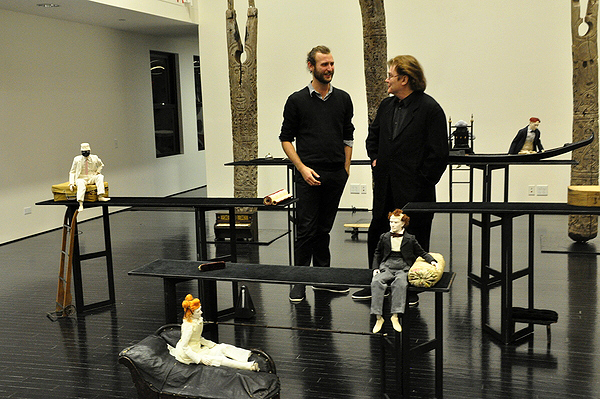
Roman Paska’s career began at age 5 from his seat in a Boston theater watching the magical Baird Marionettes.
He just didn’t know it yet.
“There’s a lesson to be learned here,” Mr. Paska said, reflecting on seeing his first live performance. “If you don’t want your child to be lured into theater, don’t ever take them to see a play.”
He laughed and gestured around the Rehearsal Hall of the Watermill Center’s South Wing, which contained five of his original puppets.
“Anything could happen. It’s a blessing or a curse,” he said.
Two weeks ago, Mr. Paska arrived on the East End for a residency at Robert Wilson’s laboratory in Water Mill. In tow, he brought five of his inanimate actors, three members of his company, Dead Puppet, and a play in progress, “Echo in Camera,” which he describes as a mental drama that recasts the Orpheus legend as a play within a play, tracing the descendant of a divided puppet protagonist through a “netherworld of his own imagination.”
Dead Puppet is a far cry from children’s theater.
“People sometimes make that association, children and puppets, and I suppose there is something in the nature of puppetry that must lend itself to that,” Mr. Paska said. “But that’s not the case here.”
His early love for puppetry was not a mere fascination, he said. It was an obsession, further solidified at age 11 when he saw Bread and Puppet Theater at the Newport Folk Festival in Rhode Island.
The production showed the young boy that puppets could be political and expressionistic. It showed him they could be both visual and performance art.
It opened his eyes to another realm of theater.
“To those of us who are attracted to it, there’s something very pure about it because we work and we sweat and we worry and so forth on a daily basis,” he said. “The puppets don’t. They’re just waiting. They’re like our little gods. They’re waiting to do their thing. We just have to rise to their level to make it happen.”
“We go to see a normal play and whoever you’re watching on stage, whatever known actor, you know they’re going to go home after and have dinner and take a shower,” he continued. “The puppets never leave the magic world, that fictional world. And that makes them very special.”
Over the last decade or so, Mr. Paska said he has made about 180 puppets—each one different in its own way, each one treading the line between realistic and stylized. While a piece of cloth on a stick can qualify as a puppet, he said, Mr. Paska is more drawn to human sculpture, particularly in the faces and hands.
“It’s quite the caliber of performance,” the Watermill Center’s digital archivist Jake Schlichting said. “I’m very excited to see what’s to come of it. He’s such a character. You can see the mastery. You can just see this aura around him. And the puppets look like him.”
The puppets themselves—which are sculpted in clay and cast in an epoxy resin—are about a third human height, half human scale, hollow and extremely delicate, Mr. Paska explained. There are no strings and there are no rods to make them move. That is up to the actor working with them.
As a young puppeteer, Mr. Paska said he would practice by holding chairs at night. It wasn’t just about building strong muscles, he said. He needed to learn how to create emotion with movement.
“You have to learn that and learn it so it becomes as instinctive as walking,” he said.
Dead Puppet actor Sam Gold agreed.
“I find if I’m not engaging my body, as well, then it doesn’t work,” Mr. Gold said. “There’s a disconnect. It’s difficult. There’s just the two of us up there, so you really have to move quickly. Sometimes we’re exchanging puppets from hand to hand, from person to person. It’s a full-body effort.”
“Our hand goes into the back of the puppet and then we have a control in the back that allows us to rotate the head and shift the shoulders and so forth,” Mr. Paska said. “It’s very hands-on, this particular set. The hands, arms, legs, feet are moved with direct intervention of the actor. We’re not trying to create the illusion that the puppets are moving by themselves. In fact, we’re trying to do quite the opposite. We want you to see that the puppets are being moved and, in fact, that they can’t move by themselves. They need us.”
Because of the scale, Mr. Paska’s productions are usually intimate, allowing the audience to connect with the puppets and all that they represent, he said.
“The essence of puppetry is the idea of animating a dead thing. Maybe that means that puppetry is always, in some way, an indication of our quest for immortality. It puts it right up there with the big themes,” Mr. Paska said. “A lot of people think puppet and ‘Hmmm.’ It’s a hard sell, at least in the United States. Less so in Europe. It’s not yet an accepted, normal part of our culture for people to go see puppet shows. It’s kind of avant-garde.”
At least for now, Mr. Paska said he doesn’t mind sitting on the margins. That comes with some risk, he pointed out.
“There’s a certain freedom being an outsider. But at the same time, it would be nice if it were easier to exist as an art form,” he said. “Puppetry, it’s very ephemeral and it’s very fragile. You’re here today, gone tomorrow. People tend to get hung up on ‘Why are you using puppets rather than actors or dancers?’ And, of course, the answer is because it’s different.”
Dead Puppet will present an open rehearsal of “Echo in Camera” on Saturday, February 9, at the Watermill Center. For more information, call 726-4628 or visit watermillcenter.org.